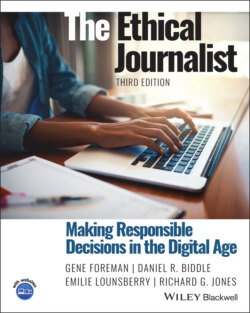Читать книгу The Ethical Journalist - Gene Foreman - Страница 40
Learning Goals
ОглавлениеThis chapter will help you understand:
journalism’s purpose and its guiding principles;
the meaning of the term social responsibility;
how journalism was practiced in an earlier era, and the ethical awakening that began in the mid-1970s;
the reasons for this period of reform; and
how today’s practice of journalism reflects decades of rising professionalism.
IN THE HORROR of September 11, 2001, many journalists risked their lives to do their jobs. Through the day, television, radio, and internet news sites reassured Americans by providing reliable information about the stunning events at the World Trade Center, the Pentagon, and a field in Shanksville, Pennsylvania. Wire services sent bulletin after bulletin around the world.
The next day, newspapers added context and analysis. Newsmagazines published special editions. “In those early defining moments of mid‐September, the nation’s news media conducted themselves with the courage, honesty, grace, and dedication a free society deserves,” Gloria Cooper wrote in Columbia Journalism Review. 1
There were casualties. A photojournalist and six television transmission engineers were killed at the World Trade Center.
“On this day of unimaginable fear and terror, journalists acted on instinct,” Cathy Trost and Alicia C. Shepard wrote in a 2002 oral history that documents the heroism: “They commandeered taxis, hitched rides with strangers, rode bikes, walked miles, even sprinted to crash sites.” Appropriately, the book’s title is Running Toward Danger.
It wasn’t competition that motivated them – cable and broadcast networks, for example, shared video that day. It wasn’t profit – the networks aired no commercials for 93 hours, and all news organizations broke their budgets to cover the story. As Trost and Shepard concluded, it could only be instinct that drove these journalists, an ingrained conviction that their profession is a high calling to public service. 2
In The Elements of Journalism, Bill Kovach and Tom Rosenstiel wrote about a craving for news that humans have had throughout history. They call it “the Awareness Instinct” – people’s need “to be aware of events beyond their direct experience.” Knowledge of the unknown, the authors wrote, gives people a sense of security. 3 Contemporary society needs reliable information to satisfy the Awareness Instinct, and it was especially in demand on September 11.
